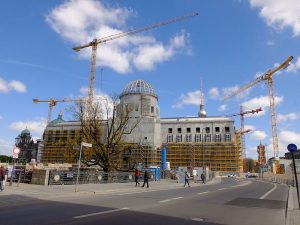This post was written by Dr Richard McClelland, a stipendiary lecturer in German and St Hugh’s and New Colleges. Dr McClelland gives an overview of this year’s Taylor lecture, by Neil MacGregor. You can watch the lecture here.
On Tuesday 13th February 2018 we were thrilled to welcome Neil MacGregor for the annual Taylor lecture. An alumnus of the university, MacGregor is the former head of the British Museum and the instigator of the popular exhibition, radio series and book ‘Germany: Memories of a Nation’. His lecture, ‘The Humboldt Forum: Two Brothers, a Palast and a Schloß’ outlined the background to his current position as Founding Director of the Humbodlt Forum in Berlin. When completed, the Forum will occupy a cluster of buildings and will contain museums, teaching rooms for the nearby Humboldt University and public spaces open to all. The Forum will be located at the eastern end of Berlin’s Unter den Linden, the long imperial boulevard that stretches across Berlin to the Brandenburg Gate. And, as MacGregor states, it has caused quite a stir…
This isn’t, after all, just any building site, but one that is redeveloping what MacGregor describes as ‘the most contested of all of Berlin’s “sites of memory”’: the former site of the Hohenzollern Stadtschloss. Completed in the middle of the 17th century and exuding Baroque opulence, the Schloss was located on the famous Museuminsel. A deliberate choice, this site represented the bringing together of influential strands of public life as a physical embodiment of the Prussian and subsequently Imperial German crown: power in the palace, knowledge in the museums and, thanks to the nearby Berlin Dom, religion.

Following heavy damage in the Second World War, the authorities of the German Democratic Republic (GDR) decided to tear the palace down. This decision was met with public outcry because it could have been saved; indeed, the similarly damaged museums were spared demolition. But the imperial grandeur did not project the correct image for the newly-founded workers’ state. In its place the authorities constructed the Palast der Republik, a people’s palace that housed the Volkskammer, the parliament of the GDR, and recreational facilities including a bowling alley. In 1990 it even became the home of the first democratically elected parliament in East Germany. Following Unification, however, it was left empty, the decaying shell an uneasy reminder of the communist past right in the heart of Germany’s new capital. In a decision that echoes the one taken some fifty years earlier, authorities demolished the building in 2008 because it contained asbestos. Or so runs the official line; again, the building didn’t project the right image for the new Republic.

In developing the Forum, then, MacGregor and the other directors must negotiate the legacy of imperial Germany, and the legacy and memory of the GDR – and address the questions, debates and often visceral reactions that each legacy provokes. The Forum, then, is an engagement with multiple strands of Germany’s history. Furthermore, it also embodies a very public debate on the legacy and impact of the nation’s past. It raises questions of how Germany remembers its past, and what this mean for the future image of Germany being projected globally. And, as MacGregor said, it also represents a very different narrative of the past than typically addressed in Britain.
